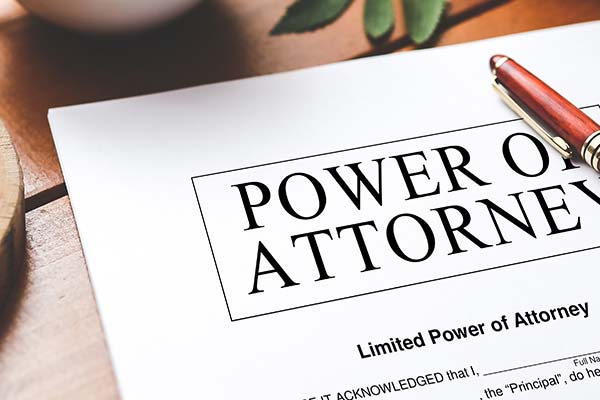Powers of Attorney
Our Powers of Attorney Practice
What is a Power of Attorney?
A power of attorney is a document that allows you to appoint a person or organization to handle your affairs while you’re unavailable or unable to do so. Unless the document includes terms to the contrary, a power of attorney takes effect when you execute it and continues in effect until it is revoked. If you only need the power of attorney in place for a limited time, you can include an expiration date in the document. In addition, if you only want the power of attorney to be used if and when you become mentally incompetent due to illness or an accident, you could specify that the power of attorney wouldn’t go into effect unless a doctor certifies that you are mentally incapacitated. The relative, friend or business you choose to be your Agent will be acting on your behalf. You need to choose someone who won’t abuse the powers you grant to them and will look out for your best interests. In general, an agent is only held responsible for misconduct that’s intentional, not for unknowingly doing something wrong.
What is a General Power of Attorney?
A general power of attorney is very broad and provides extensive powers to the person that you appoint as your agent. These powers usually include:
- Handling banking transactions
- Entering safety deposit boxes
- Handling transactions involving U.S. securities
- Buying and selling property
- Purchasing life insurance
- Settling claims
- Entering into contracts
- Exercising stock rights
- Buying, managing or selling real estate
- Filing tax returns
- Handling matters related to government benefits
Some additional powers that you can opt to include in your power of attorney are:
- Maintaining and operating business interests
- Employing professional assistance
- Making gifts
- Making transfers to living trusts
- Disclaiming interests (this has to do with estate planning strategies to avoid estate taxes)
A general power of attorney is usually used to allow your agent to handle all of your affairs during a period of time when you are unable to do so. For example, when you are traveling out of the state or country or when you are physically or mentally unable to handle your affairs.
What is a Limited/Special Power of Attorney?
A limited power of attorney allows you to give only specific powers to the person or organization you appoint as your agent.
Many people use the special power of attorney to authorize their Agent to do one or several of the following:
- Handle banking transactions
- Enter safety deposit boxes
- Handle transactions involving U.S. securities
- Collect debts
- Buy/Sell real estate
- Mortgage real estate
- Manage real estate
- Sell personal property
- Borrow money
- Manage business interests
- Handle government issues
- Make financial decisions
- Make estate planning decisions, including gifts
A limited power of attorney is often used to allow your Agent to handle specific situations for you when you are unavailable or unable to do so. For example, buying or selling real estate when you are away on business and unavailable for the closing.
What is a Durable Power of Attorney?
A “durable” power of attorney is a general, limited/special or health care power of attorney that contains special durability provisions. If you become mentally incompetent while you have a power of attorney document that’s already in effect, a durability provision will allow the document to stay in effect. A general durable power of attorney and a durable health care power of attorney are frequently included as part of an estate plan to make sure that you have covered the possibility that you might need someone to handle your financial and health care affairs if you are unable to do so.

